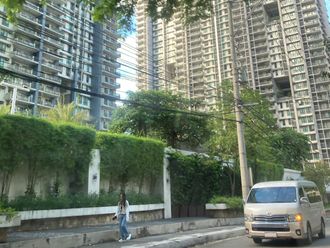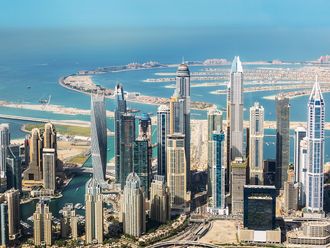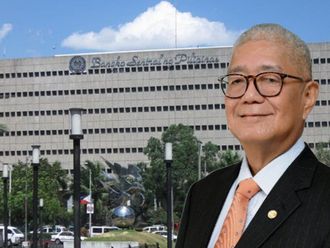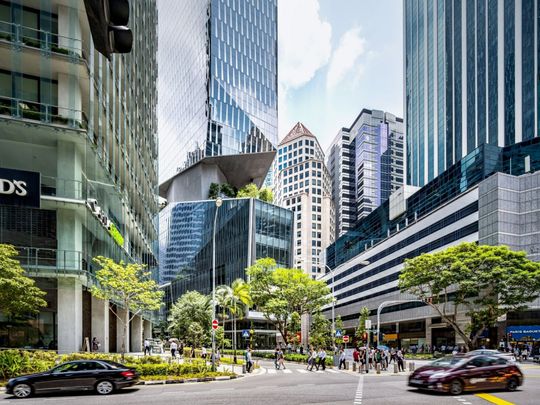
Manila: Chris Bernardo, 45, an overseas Filipino worker (OFW), took out a mortgage for a 4.5 million-peso ($79,037) condominium property in Manila's swanky Bay City district. That was in 2019, before the pandemic hit.
A year prior, in 2018, he snapped up a two-bedroom property off-plan, then "flipped" it to a foreign buyer, a Chinese, by the time it was ready for occupancy. Bernardo made a quick 1-million-peso profit.
Now, with a second property, he planned to either rent it out or quickly do another “flip”, expecting to make another hefty profit.
One night, during Chinese New Year celebrations in the Golden City (Macapagal Avenue area), millions of 500- and 1,000-peso bills were thrown down from buildings and caused the closure of streets down below.
This time, neither happened. His new Makati property now lies empty for months, with no sign of interest among potential renters or buyers. It’s the POGO shutdown effect.
Gaming effect
POGO stands for Philippine Offshore Gaming Operator. These are companies that offer online gaming (mostly gambling) services to foreign players, primarily based in mainland China.
With its relatively lenient regulations, the country became a POGO hub. At its peak, the industry employed an estimated 350,000 people, foreigners and Filipinos.
Recently, these gaming hubs have shown their ugly head. Some had been used as fronts for forced labour, torture, online scams and other illegal activities. Reports have also emerged showing POGOs have become a smokescreen for scammers, with employees forced to beat daily quotas of scam victims.
Philippine police reported a number of POGO-related kidnapping incidents. Manila has taken steps to regulate it, including stricter licensing requirements and higher taxes. In July, President Ferdinand “Bongbong” Marcos Jr. has ordered the shutdown of POGOs by December 2024.
• Speed is crucial in fast flips to minimise holding costs like mortgage payments and property taxes.
• Investors often focus on properties in high-demand areas and use cash or fast financing options to close deals quickly.
• This strategy can yield significant returns if executed well, but is risky during a market correction.
Though the number of POGO jobs fluctuated, it saw its peak during the six years under former President Rodrigo Duterte.
Jayson, 37, a Grab driver, offers an anecdotal evidence of how POGOs benefited locals: “I was able to buy my own car, tips were about 1k pesos ($20) per per head, whole-day booking was about 10k (pesos, about $180), plus tips. Aides personally close to the POGO executives were given condo units and cars, etc,” he said.
“One night, during Chinese New Year celebrations in the Golden City (Macapagal Avenue area), millions of 500- and 1,000-peso bills were thrown down from buildings and caused the closure of streets around it,” Jayson added.
Effect of POGO exodus
During its peak, Bay City's Macapagal Avenue comes alive from 11pm to 7am. “You see lots of people walking dazed, vomiting, throwing money, gambling, etc... Las Vegas pales in comparison,” a Manila-based executive said.
He said any talk of an "oversupply" situation following a POGO pullout is not backed by data.
“The property market in and around the POGO hubs will be hit by their eventual pullout. But the effect tends to be localised — in terms of demand for goods and services. I don't see it affecting the Philippine economy in general,” said Jovi Tupaz, a Philippine Professional Regulation Commission (PRC)-licensed consultant.
79.1%: Overall occupancy rate
1,035 pesos/sqm ($18): Average monthly rent
[Source: Santos Knight Frank]
Resilient economy
Joey Bondoc, head of research at Colliers, told an industry gathering on Thursday (August 15, 2024) that the Bay City, also known as the Manila Bay Freeport Zone (the reclamation area on Manila Bay located west of Roxas Boulevard), could be be hit the hardest.
Bondoc then pointed to the flip-side.
“Traditional and BPO deals continue to prop up market uptake, given the spike for MICE (meetings, incentives, conferences, and exhibitions) facilities and foreign brands betting big on Philippine tourism. Arrivals and occupancies are starting to double up,” Bondoc said during the Asia Real Estate Forum in Manila.

Now is the time to pivot to fundamentals, based on realistic demand and infrastructure buildup — which include freeways, mega bridges, toll roads, mass transport, industrial parks, and tourism.
Tupaz added: “Now is the time to pivot to more real estate fundamentals, based on realistic demand and infrastructure buildup — which include freeways, mega bridges, toll roads, mass transport, industrial parks, and tourism.”
Soft demand
With the POGO shutdown ordered by the current government, property values may remain soft in the near future.
$ 18 /sqm
Average monthly rent for office space in Manila.Post-POGOs, Tupaz said: “Yes, there will adjustments in the next 2 to 3 years. But the economy is resilient enough as it banks on key demand drivers — strong fiscal and monetary policies, good governance, young population, tourism growth and, of course, our OFW heroes."
The correction, coupled with the country’s organic growth, presents an opportunity. Tupaz added: “Now is the time to pivot to more real estate fundamentals, based on realistic demand and infrastructure buildup — which include freeways, mega bridges, toll roads, mass transport, industrial parks, and tourism.”
Raquel Manuel Abad, a professor of economics and a licensed real estate professional, said while the POGO shutdowns did affect certain hubs such as Pasay (Mall of Asia district), Malate, Tarlac, Cebu, Makati and Cavite, there’s a lot going on in other sectors and areas with their own dynamics.

About 10 years ago, off-plan one-bedroom units would go as low as 2.4 million pesos for a 28-sqm property. Now the lowest off-plan unit of a similar size is around 5.5 to 6 million pesos ($105,000). Property values, with inflation, are not coming down.
“As an investment destination, the Philippine property market has shown resilience,” she said. "About 10 years ago, off-plan one-bedroom units would go as low as 2.4 million pesos for a 28-sqm property. Now the lowest off-plan unit of a similar size is around 5.5 to 6 million pesos ($105,000). Property values, with inflation, are not coming down," Abad said.
As the Philippines emerged as the region’s fast-rising shopping destination, demand could only grow, she added.
“The digital nomad community is gaining ground, while foreign retirees are on a buying spree in the country, due to basic affordability factor as well as practicality – for them to obtain a retiree’s visa for long-term stay,” she said.
Property tax
A huge part of this dynamic is pro-active regulation.
One reason property values remain stable, Abad explained: “The government computes property tax based on the zonal value. So even if the selling price is marked down, in cases of distressed sale, tax will be computed as per updated zonal value."
It's a disincentive for wild price markdowns, she added. "It may also invite suspicion. "One property with a market value of 20 million pesos being sold for 8 million, has no takers, as it's linke to POGOs. The buyer may invite trouble with such a purchase," she said.
The flipside of stricter regulations is greater emphasis on tourism infrastructure development, which helps boost demand.
“We have a steady stream of visitors from the South Korea, the US, China, Japan and other Asian neighbours. These helps keep the demand for support infrastructure healthy.”
Office Sector:
• Occupancy rates have been steadily increasing for three consecutive quarters.
• Demand for flexible workspace is on the rise.
•A shift towards collaborative and social office spaces is evident.
Residential Sector:
• Luxury property prices have surged, aligning with the global trend.
• Growing interest in second homes, especially in leisure condominiums outside Metro Manila.
Retail Sector:
• Mall foot traffic is showing signs of recovery.
• Retail sector remains resilient.
Overall Market:
• The Philippine real estate market is poised for a transformative year.
• Demand for housing and office spaces outside Metro Manila is increasing.
The report also emphasises the potential for landlords and developers to explore opportunities beyond traditional CBDs.
Correction, opportunity
As a result, the property market is experiencing a correction, with rental rates and property values adjusting downward as demand dries up in POGO hubs.
The overall Philippine property market, however, remains resilient. Tupaz told Gulf News that given the country's track record for decades-long economic growth, investor and consumer confidence remain healthy.
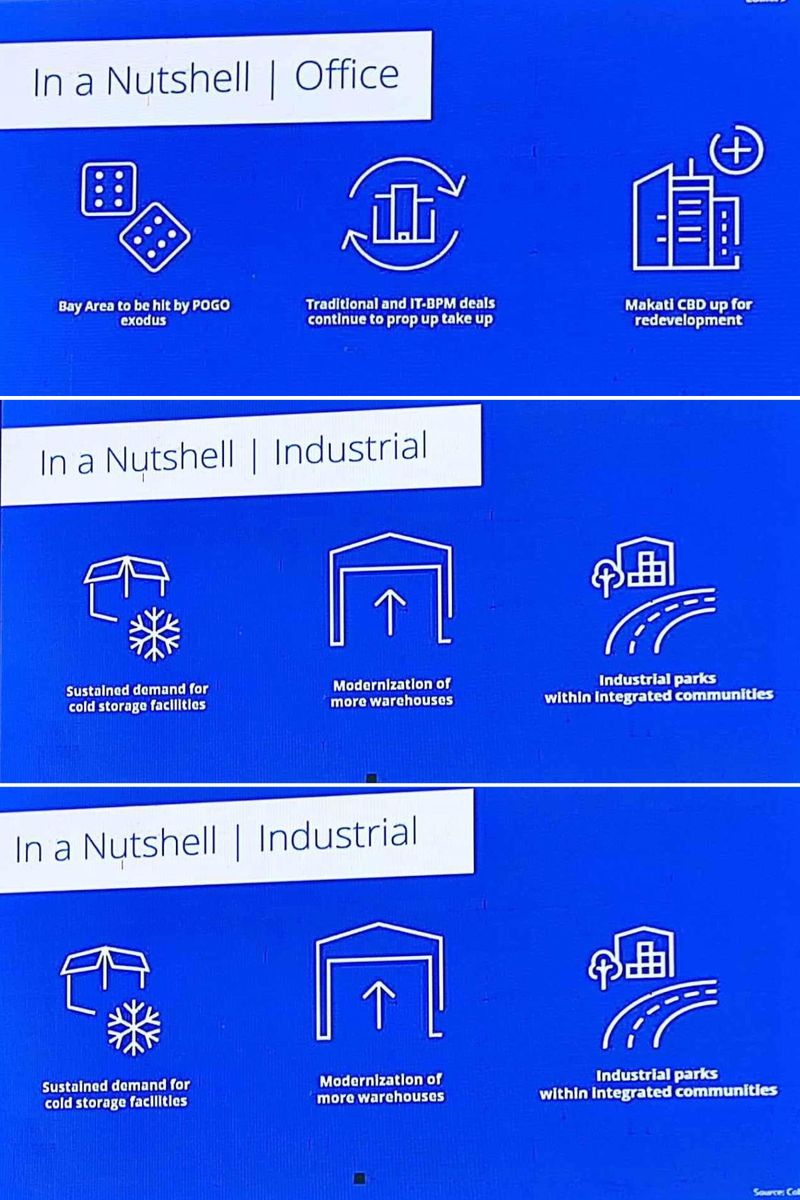
He noted that fresh initiatives in transport infrastructure with more Metro lines and the Manila Subway lined up will spark property development and urban expansion.
“Their impact extends far beyond these areas — they regenerate spaces, stimulate economic activity, the movement of goods and people. This attracts more businesses, and demand from consumers and visitors,” said Tupaz.
Disclaimer: This is intended for general knowledge and informational purposes only. It does not constitute professional property advice. For personalised guidance and recommendations please consult with a licensed real estate broker or developer to suit your specific needs.

